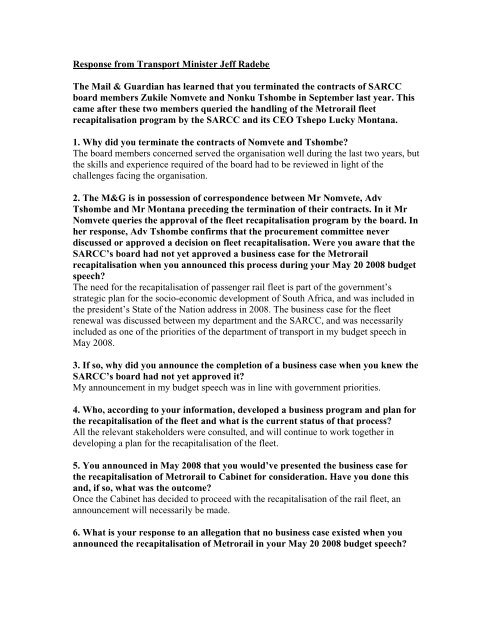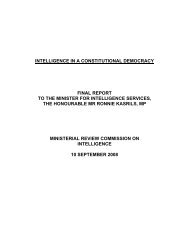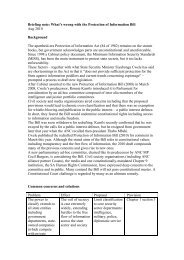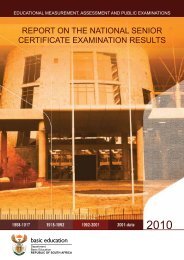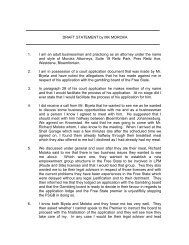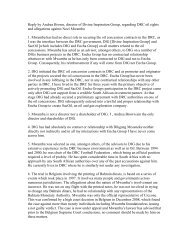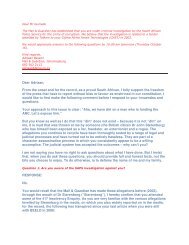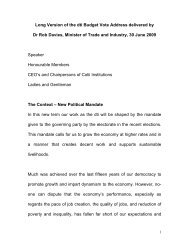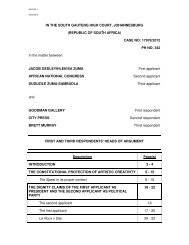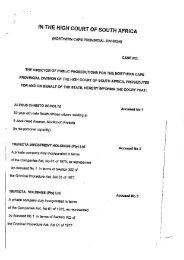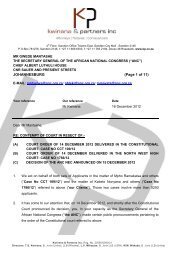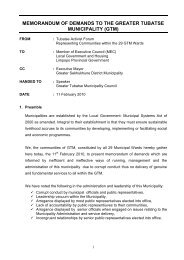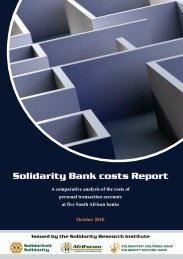Response by Transport Minister Jeff Radebe - Mg - Mail & Guardian
Response by Transport Minister Jeff Radebe - Mg - Mail & Guardian
Response by Transport Minister Jeff Radebe - Mg - Mail & Guardian
Create successful ePaper yourself
Turn your PDF publications into a flip-book with our unique Google optimized e-Paper software.
<strong>Response</strong> from <strong>Transport</strong> <strong>Minister</strong> <strong>Jeff</strong> <strong>Radebe</strong><br />
The <strong>Mail</strong> & <strong>Guardian</strong> has learned that you terminated the contracts of SARCC<br />
board members Zukile Nomvete and Nonku Tshombe in September last year. This<br />
came after these two members queried the handling of the Metrorail fleet<br />
recapitalisation program <strong>by</strong> the SARCC and its CEO Tshepo Lucky Montana.<br />
1. Why did you terminate the contracts of Nomvete and Tshombe?<br />
The board members concerned served the organisation well during the last two years, but<br />
the skills and experience required of the board had to be reviewed in light of the<br />
challenges facing the organisation.<br />
2. The M&G is in possession of correspondence between Mr Nomvete, Adv<br />
Tshombe and Mr Montana preceding the termination of their contracts. In it Mr<br />
Nomvete queries the approval of the fleet recapitalisation program <strong>by</strong> the board. In<br />
her response, Adv Tshombe confirms that the procurement committee never<br />
discussed or approved a decision on fleet recapitalisation. Were you aware that the<br />
SARCC’s board had not yet approved a business case for the Metrorail<br />
recapitalisation when you announced this process during your May 20 2008 budget<br />
speech?<br />
The need for the recapitalisation of passenger rail fleet is part of the government’s<br />
strategic plan for the socio-economic development of South Africa, and was included in<br />
the president’s State of the Nation address in 2008. The business case for the fleet<br />
renewal was discussed between my department and the SARCC, and was necessarily<br />
included as one of the priorities of the department of transport in my budget speech in<br />
May 2008.<br />
3. If so, why did you announce the completion of a business case when you knew the<br />
SARCC’s board had not yet approved it?<br />
My announcement in my budget speech was in line with government priorities.<br />
4. Who, according to your information, developed a business program and plan for<br />
the recapitalisation of the fleet and what is the current status of that process?<br />
All the relevant stakeholders were consulted, and will continue to work together in<br />
developing a plan for the recapitalisation of the fleet.<br />
5. You announced in May 2008 that you would’ve presented the business case for<br />
the recapitalisation of Metrorail to Cabinet for consideration. Have you done this<br />
and, if so, what was the outcome?<br />
Once the Cabinet has decided to proceed with the recapitalisation of the rail fleet, an<br />
announcement will necessarily be made.<br />
6. What is your response to an allegation that no business case existed when you<br />
announced the recapitalisation of Metrorail in your May 20 2008 budget speech?
A business case for the recapitalisation of SARCC has been developed in consultation<br />
with all stakeholders, in line with the national priorities identified <strong>by</strong> the government of<br />
South Africa.<br />
7. The M&G has reliable information that the Metrorail recapitalisation program<br />
was never managed in the SARCC, but “somewhere else”. What is your comment to<br />
this?<br />
All the relevant stakeholders are involved in the recapitalisation of SARCC.<br />
8. The timing of their removal from the SARCC board suggests that the criticism <strong>by</strong><br />
Nomvete and Tshombe of the recapitalisation process was directly linked to your<br />
decision to terminate their contracts. Is this so? Did their correspondence with Mr<br />
Montana two weeks prior to their removal influence your decision?<br />
This inference is incorrect. Please refer to my comments under point 1.<br />
<strong>Response</strong> from SARCC CEO Lucky Montana<br />
1. Why were the contracts of board members Zukile Nomvete (chair) and Nonku<br />
Tshombe (chair of procurement committee) terminated in September 2008?<br />
The decision to appoint and remove board members of the SARCC rests and is the<br />
responsibility of the minister of transport. The board appointments were made <strong>by</strong> the<br />
minister with the concurrence of Cabinet.<br />
2. Did Mr Montana have any role to play in the removal of these two board<br />
members? Please elaborate.<br />
No, the CEO is not involved in the appointment of board members. The CEO raised on<br />
various occasions to the board and the shareholder (minister of transport) concerns about<br />
board effectiveness/leadership and poor governance practices in some instances. The<br />
board also set up a governance committee to address these challenges. The CEO hoped<br />
that the governance challenges that the board was aware of would be resolved <strong>by</strong> the new<br />
board.<br />
3. Was Mr Montana in support of the removal of these two board members from the<br />
SARCC board? If so, why?<br />
The CEO accepted the decision of the shareholder [<strong>Radebe</strong>] to reconstitute the board,<br />
obviously it being the prerogative of the shareholder. Also refer to the above response<br />
(question 2).<br />
4. The M&G is in possession of correspondence between Mr Nomvete, Adv<br />
Tshombe and Mr Montana preceding the termination of their contracts. In it Mr<br />
Nomvete queries the approval of the fleet recapitalisation program <strong>by</strong> the board. In<br />
her response, Adv Tshombe confirms that the procurement committee never<br />
discussed or approved a decision on fleet recapitalisation. Why did the SARCC<br />
develop a business case for the recapitalisation of the Metrorail fleet – that was<br />
presented to Cabinet <strong>by</strong> the minister – without board approval?
On 9 February 2007 the president of South Africa in his state of the nation address stated,<br />
our program in the social sector for this year will also include (among other things):<br />
Speeding up the implementation of the taxi recapitalisation project, implementing<br />
detailed plans for passenger rail and road transport including the Bus Rapid Transit<br />
System in the Metros and recapitalisation of Metrorail.<br />
In part this pronouncement was based on a National Rail Plan accepted <strong>by</strong> Cabinet on 7<br />
December 2007. Following a Cabinet meeting on 7 December 2007, the meeting received<br />
a report on the Interim National Passenger Rail Plan, which identifies priority corridors,<br />
rail recovery initiatives and so on. The essence of the plan was approved, and work is<br />
meant to start soon on regional business plans, including transport needs outside of the<br />
congested areas.<br />
In a quarterly report <strong>by</strong> the CEO submitted to the board for the 30 July 2008 meeting and<br />
discussed on 31 August 2008 it was stated: “The SARCC is assisting the department of<br />
transport put together a comprehensive business case for the acquisition of a new<br />
generation of rolling stock fleet for submission to Cabinet. The chief executive officer of<br />
the SARCC had extensive discussions with the Directors General of the department of<br />
transport, national treasury and the department of trade and industry, as is required <strong>by</strong><br />
government and Cabinet processes in particular, in the period of the compilation of the<br />
Cabinet Memorandum.<br />
Part of the recommendations were that an intergovernmental team be formed, chaired <strong>by</strong><br />
the department of transport to implement a fleet acquisition strategy for Metrorail (with<br />
SARCC represented in the team).<br />
On page 27 of the SARCC business plan approved <strong>by</strong> the board in February 2008 it was<br />
stated: “An analysis of the age profile of the current fleet indicates that the refurbishment<br />
and upgrading of the fleet could address the current problem of train set availability. As<br />
indicated in 2007/08, the refurbishment of coaches does not hold the future prospect for<br />
the company.<br />
“The shortage of rolling stock is already undermining the delivery of efficient and<br />
reliable passenger services. The SARCC will therefore embark on the initiative to<br />
recapitalise its fleet in order to meet current and future demands. It is important that a<br />
long-term perspective is adopted which begin to address challenges on how the company<br />
will meet its obligations under the Legal Succession Act and adequately meet future<br />
passenger demands.<br />
“Projections that take into account population growth, economic growth, government’s<br />
transport policy objectives aimed at promoting public transport over private car use, the<br />
costs associated with congestion and emergence of new residential settlements as well as<br />
new demands for public transport and rail services indicate that future demands for rail<br />
services would increase significantly.<br />
“Technical and operational specifications for the new rolling stock fleet were finalised<br />
and a tender for the new fleet developed during the 2007/08 financial year. Procurement<br />
processes for the acquisition of new rolling stock fleet tend to be most intense and the<br />
corporation will invite bidders early in the financial year to submit proposals for the<br />
manufacture and supply of new generation Rolling Stock.<br />
“Whilst the SARCC, in consultation with the DOT, is finalising private finance options<br />
of rail infrastructure, the strategic nature of rail requires that government plays the<br />
leading role in financing of Rolling Stock and rail infrastructure.”
To the knowledge of the SARCC the fleet recapitalisation tender has not been presented<br />
to Cabinet.<br />
5. Who developed a business program and plan for the recapitalisation of the fleet<br />
and what is the current status of that process?<br />
For point questions 5 and 6 please refer to answers in question 4.<br />
6. What is your response to the allegation that no business case existed when<br />
minister <strong>Radebe</strong> announced the recapitalisation of Metrorail in his May 20 2008<br />
budget speech?<br />
For point questions 5 and 6 please refer to answers in question 4.<br />
7. The M&G has reliable information that the Metrorail recapitalisation program<br />
was never managed in the SARCC, but “somewhere else”. What is your comment to<br />
this?<br />
The case for recapitalisation was developed <strong>by</strong> the SARCC and the DOT, also included<br />
in the National Rail Plan presented to cabinet.<br />
8. Is the termination of Nomvete and Tshombe’s contracts in any way related to<br />
their criticism of the way the recapitalisation of Metrorail and its business case was<br />
handled <strong>by</strong> the SARCC?<br />
No.<br />
9. If not, how should their criticism of the program a mere two weeks before their<br />
removal be interpreted?<br />
The department of transport can provide reasons for the removal of board members. The<br />
process to appoint board members takes more than two weeks as a memo starts with the<br />
department of transport, gets approval from the minister of transport and then submitted<br />
to a Cabinet committee (governance), and finally to the Cabinet secretariat for<br />
distribution to various ministries before a Cabinet meeting (this process can not take two<br />
weeks).<br />
10. Has a tender been issued for the recapitalisation of Metrorail? If so, what is the<br />
current status of this tender process? If not, when does the SARCC plan to advertise<br />
the tender?<br />
To the knowledge of the SARCC no tender has been issued for the fleet acquisition for<br />
Metrorail. The decision to go on tender and final awarding of the tender on the<br />
acquisition of the Metrorail fleet will be taken <strong>by</strong> Cabinet.


